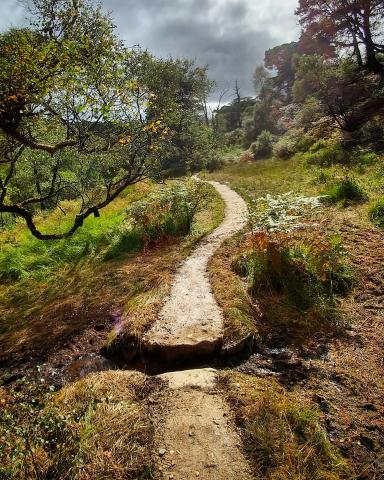Rangers manage areas of countryside such as woods, wetlands, common land and National Parks. The main focus is on environmental conservation, wildlife management, education, advice, access and maintenance.
They consider themselves part of a national service despite working for a range of employers in different environments. Environmental education is at the core of their work to support the conservation of local landscapes.
Rangers require a deep interest in the natural environment, an ability to work both alone and as part of team as well as the ability to work well with the general public.
Tasks include:
- Patrolling to assist visitors
- Taking part in a variety of environmental projects
- Providing information to visitors
- Delivering educational talks to groups as well as administration and management related to maintenance
- Health and safety
- Pest control
- Land-owner liaison.
There is scope for specialisation as a career develops.
In the UK there are many employers, from both public and private sectors, who employ countryside rangers or officers. Rangers have been active since the 1950s throughout Scotland with the role now widespread throughout all landscapes and environments.
Working Conditions
Rangers operate mainly outdoors in all weather conditions although a number of tasks take place in an office or visitor centre. These may be open seven days a week at all times of the year with the intensity and timing of work related to the visitor seasons.
In larger countryside organisations, rangers are likely to work on a rota system with other members of staff, including early mornings, evenings and weekends. Rangers should be fit and prepared to do a good deal of walking. There may be opportunities for both full-time and part-time work around the normal 37-hour week.
Rangers contribute to an essential part of land management and conservation, benefiting both lowland and upland landscape sites as well as other habitats.
The work itself is varied and demands flexibility, diligence and enthusiasm for education and conservation. Rangers combine excellent local knowledge and the skills of an experienced manager with a deep understanding of the countryside and a willingness to develop and communicate those skills. A full driving licence is usually essential.
Salary
Salaries vary with experience, qualifications and between companies, but here's a guide to what you can expect.
£18,000
£30,000
Getting started
It is important to:
- Have an enthusiasm and interest in natural heritage, conservation, education and countryside habitats.
- Enjoy working mainly outdoors carrying out a variety of tasks
- Have a capacity to engage positively with the general public.
Work experience on a countryside site is very useful not only as an introduction to ranger work but also for gaining a position as a trainee ranger. There are a variety of routes to gaining a position and it is possible to work up through an organisation by gaining experience and taking educational courses.
What experienced workers can do
- Manage habitats such as woods, wetlands, parks
- Communicate with others
- Work and liaise with local communities and agencies
- Manage budgets
- Plan and maintain resources
- Monitor pest and predator populations
- Stalk and cull deer
- Maintain and improve game and wildlife habitats.
Personal qualities you should have
- Manage habitats such as woods, wetlands, parks
- Communicate with others
- Work and liaise with local communities and agencies
- Manage budgets
- Plan and maintain resources
- Monitor pest and predator populations
- Stalk and cull deer
- Maintain and improve game and wildlife habitats.
Next steps
If you are conscientious, dedicated and demonstrate an affinity for the countryside there may be opportunities for promotion to a more senior position, especially if you work for one of the bigger organisations.
If you are with a smaller organisation working as a Ranger, you may have to move to find a promoted position such as Head Ranger. This position involves managing all aspects of the countryside management programme including project planning, budget control and land owner liaison.
Useful links
Loch Lomond and the Trossachs National Park
Scottish Environment Protection Agency
